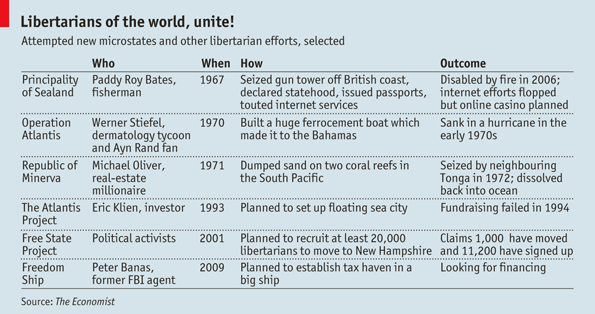What would it look like?
Published on 17 Dec 2012
Why seastead? Joe Quirk, co-author of the forthcoming seasteading book, has more than a couple of reasons. Joe was one of dozens who attended the Seasteading Conference 2012 in San Francisco, which brought together dedicated adventure seekers and entrepreneurs looking to transform the ocean into the next frontier for humanity. Every great change throughout history has begun with a group of individuals who dreamt up a desire, and then acted to make their vision a reality. The number of reasons behind the desire to seastead are as numerous as the number of people in our community. Why are you seasteading?
Why Seastead? The Seasteading Institute Promotional Video - YouTube
The Seasteading Institute | Opening humanity's next frontier
Seasteading is the concept of creating permanent dwellings at sea, called seasteads, outside the territory claimed by the government of any standing nation. Most proposed seasteads have been modified cruising vessels. Other proposed structures have included a refitted oil platform, a decommissioned anti-aircraft platform, and custom-built floating islands.[1] No one has created a state on the high seas that has been recognized as a sovereign nation, although the Principality of Sealand is a disputed micronation formed on a discarded sea fort near Suffolk, England.[2]
The closest things to a seastead that have been built so far are large ocean-going ships sometimes called "floating cities", and smallerfloating islands.
Seasteading - Wikipedia, the free encyclopediaThe 'most popular novel ever' according to the Modern Library is 'Atlas Shrugged' by Ayn Rand:
100 Best Novels « Modern Library
Jay Doubleyou: english literature
Atlas Shrugged - Wikipedia, the free encyclopedia
Free cities:
Honduras shrugged
Two start-ups want to try out libertarian ideas in the country’s new special development regions
Dec 10th 2011 | From the print edition
DISGUSTED by an increasingly invasive state, America's most capable entrepreneurs retreat to Galt's Gulch, a libertarian commune. That was the theme of Ayn Rand's magnum opus, “Atlas Shrugged”, a sacred text for libertarians ever since it was published in 1957. Actually creating such an enclave has been the dream of many fans of small government (or of none at all). Several have had a try at it, but their efforts have always ended in disaster (see table).
DISGUSTED by an increasingly invasive state, America's most capable entrepreneurs retreat to Galt's Gulch, a libertarian commune. That was the theme of Ayn Rand's magnum opus, “Atlas Shrugged”, a sacred text for libertarians ever since it was published in 1957. Actually creating such an enclave has been the dream of many fans of small government (or of none at all). Several have had a try at it, but their efforts have always ended in disaster (see table).

Now, for the first time, libertarians have a real chance to implement their ideas. In addition to a big special development region, the Honduran government intends to approve two smaller zones. And two libertarian-leaning start-ups have already signed a preliminary memorandum of understanding with the Honduran government to develop them.
One firm goes by the name of Future Cities Development Corporation. It was co-founded by Patri Friedman, a grandson of Milton Friedman, a Nobel laureate in economics, and until recently executive director of the Seasteading Institute, a group producing research on how to build ocean-based communes. The other is called Grupo Ciudades Libres (Free Cities Group) and is the brainchild of Michael Strong and Kevin Lyons, two entrepreneurs and libertarian activists.
Both share a purpose: to build “free cities”. Last April all three spoke at a conference organised by Universidad Francisco Marroquín, a libertarian outfit in Guatemala. In September they and Giancarlo Ibárgüen, the university's president, launched the Free Cities Institute, a think-tank, to foster the cause.
As so often with enthusiasts, divisions within the cause run deep. The two firms hail from different parts of the libertarian spectrum. Mr Friedman is an outspoken critic of democracy. It is “ill-suited for a libertarian state”, he wrote in an essay in 2009—because it is “rigged against libertarians” (they would always lose) and inefficient. Rather than giving its citizens a voice, he argues, they should be free to exit; cities should compete for them by offering the best services.
No comments:
Post a Comment